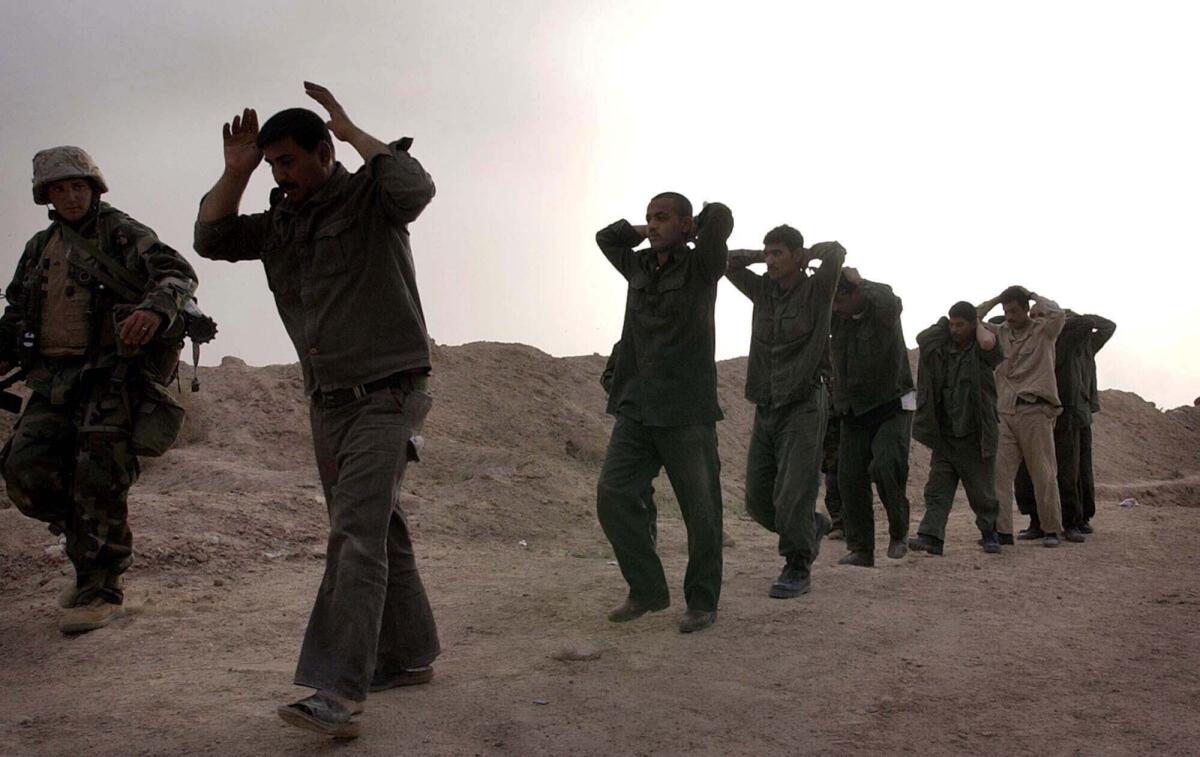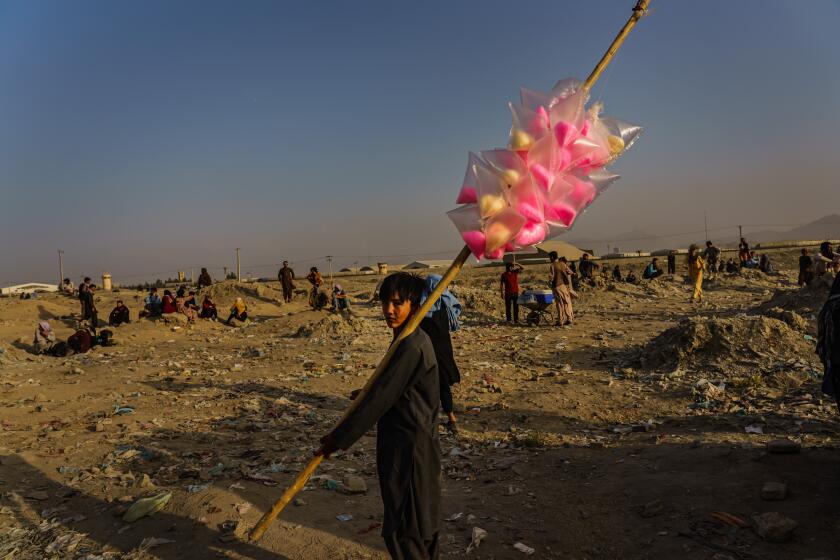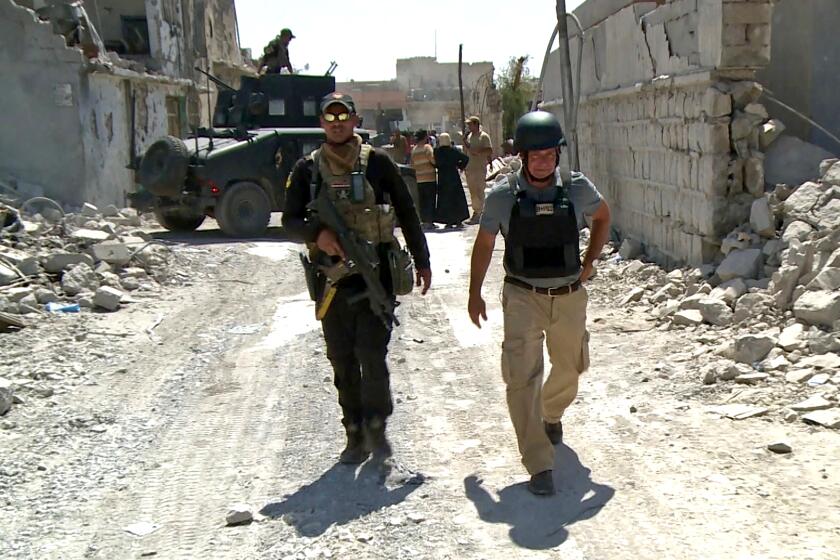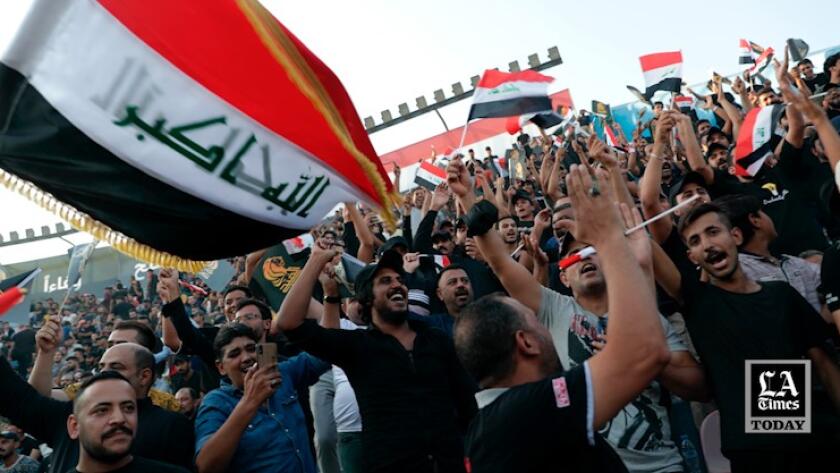Commentary: Iraq is the war no one wants to remember. As an Iraqi American, I can never forget

- Share via
The skies over Baghdad were “lit up like a Christmas tree.”
The phrase, despite its joyful connotations, was used often during those first few hours of the attack — which the U.S. military dubbed Operation Shock and Awe — by news anchors who struggled to describe the alternately dark and explosive scenes broadcast out of Baghdad. Twenty years ago today, a U.S.-led coalition invaded Iraq’s capital, dropping bombs in the dead of night, decimating buildings and bridges before our eyes, igniting palm trees like so many angry torches.
The opening salvo of the Iraq war, watched by millions of Americans, was an assault we assumed we’d never forget. A frightening sign of the times, like the 9/11 attacks. A defining event of the new 21st century.
Except the 20th anniversary of the start of the war, unlike the nationwide commemorations of Sept. 11, has crept up on us like an unwanted memory, tucked behind news of bank failures and miraculous weight-loss drugs. There’s nary a moment of national reckoning. No major parades. No commemorative postage stamp. It’s the war no one wants to remember — and the one, as an Iraqi American, I’ll never forget.
From ‘Shock and Awe’ to the death of Bin Laden, U.S. networks treated the war as a distant spectacle. Overseas, it was brutally, frightfully close.
The invasion irrevocably changed the course of my life and my family’s, and its aftermath continues to reshape our lives and destinies — from cousins still displaced throughout the Middle East to their children, denied anything but Iraqi citizenship, even though they’ve never been to Iraq. It’s ripped us apart and brought us back together, changing the very identity of those fortunate enough to survive seven years of warfare; the destruction of infrastructure for clean water, electricity and healthcare; the rise of violent extremism; the return of rampant corruption; and the neglect of those who vowed to help. For U.S. troops who fought in the war, forgetting is no easier: Though their scars and memories are markedly different, Iraq is part of them, too.
It’s understandable why folks might prefer to overlook what has come to be seen as a shameful chapter in American history. First it became clear that the invasion was predicated on false intelligence that then-Iraqi President Saddam Hussein was colluding with Al Qaeda and stockpiling weapons of mass destruction. Then, after tens of thousands of lives lost and the displacement of millions of Iraqis, we left the region in considerably worse shape than we found it. It’s unclear when, or if, the region will ever recover.
My father’s family tree had roots in Baghdad that dated back centuries until they were severed by the war. My dad was born in the time of the British mandate in Iraq. He learned to swim in the Tigris River and honed his business acumen in his father’s tea shop off Rashid Street before striking out on his own. He was the first of his family to attend college, at the University of Baghdad, and the first to leave Iraq. In the late 1950s, he immigrated to Los Angeles, where he attended USC, met my mom, married and settled in the San Fernando Valley. There, his three girls spent much of their childhoods trying to convince their peers that Baghdad was indeed a real place, despite what they saw in Hanna-Barbera cartoons.
Cancer took Dad in the late 1980s; ironically, it was caused by schistosomiasis, a parasitic disease caused by flatworms found in the rivers of North Africa and the Middle East. While Baghdad had come back to claim him, his death meant that we — the only American Alis — lost our connection with Iraq, and that chasm grew with the discord of global politics. Hussein’s dictatorship, the Gulf War of the early 1990s, the U.S.-led embargo and our shoddy Arabic language skills further distanced us from our aunts, uncles and 35 first cousins overseas. Still, my sisters and I reasoned that the family would always be in Iraq, and Baghdad would always be there for us.
So when “Operation Shock and Awe” hit Baghdad, I didn’t see an illuminated Christmas tree or a spectacular fireworks display. I imagined losing people that I loved, forever. It marked the beginning of a journey to find my family wherever I could: Jordan, Syria, the United Arab Emirates and, yes, eventually, Baghdad, in an attempt to mend us back together as the region unraveled. What I found was life-affirming and heartbreaking.
My Iraqi family was, and remains, imprinted by every stage of the conflict. They hid in bathtubs and under stairs during the bombing campaign and watched in horror as antiquities were looted from the National Museum of Iraq during that first month of the war. They fled across closed borders with mortally sick kids in 2006 by bribing border guards and narrowly escaped mass execution by Islamic insurgents after the withdrawal of U.S. troops. Today, they still pay extortionist fees to transport the bodies of loved ones back to Wadi al Salam, a holy cemetery for Shiite Muslims in Najaf, Iraq.

If this sounds like a sob story, that’s because it is. It’s hard not to cry when remembering the final conversation I had with my Uncle Mahdi before he died outside his homeland. He was sick, languishing in a hot apartment in a refugee enclave in Syria. The banter of kids who should have been in school, back in Baghdad, punctuated our conversation as they played soccer in the wasteland outside. I sat for days at the side of Mahdi’s bed, listening to stories of his childhood and the fall of a city he loved. He asked me to write about what I saw him going through — the displacement, the loss — so the rest of the world understood. If only I had that power.
But here I am now, asking: Please don’t forget Uncle Mahdi, or any of the others whose lives were ended and forever changed by a war no one wants to remember.
The imperative to remember is not simply about laying blame, though. It’s as much about analyzing our intentions in the moment as it is about recognizing the consequences of our actions after the fact. The invasion was sold to the American public as a patriotic and corrective measure, punishment for attacks on American soil and protection against future plots. Despite a stunning lack of evidence implicating Hussein, the country came together behind a shared goal: Stop the bad guys.
When newspaper columnists and TV correspondents express shock at European conflict, they reveal a damning belief that war is acceptable elsewhere.
At the time of the invasion, I was working at Newsweek magazine, where even the seasoned senior editors were discussing events as one might abstractions on a map: Where are the critical strategic points in the city? The government headquarters? TV stations? Oil refineries? It was perhaps the last time the U.S. media, and the U.S. public, were united behind one cause, and when the facade crumbled, so too did our trust in a system that allowed the architects of war so much unilateral power.
Recognizing the 20th anniversary of the Iraq war requires some pretty harsh introspection. As it did in Vietnam, the U.S. invaded Iraq with little vision for what would come after the initial bombardment and lost the war in a slow drip of missteps. We need to recognize these patterns of the past if we’re ever to change them. And we must be willing to admit their analogue in the present — as Russia, a huge military power, invades Ukraine, a small sovereign country, on its own false pretense of liberation — in order to fight back.
Baghdad may have appeared deserted in that early feed of “Shock and Awe” footage we all watched 20 years ago. But it’s clear now what was missing from the frame: humans. For those of us who experienced the deluge, or who were connected to the terrified people below, that day is not something we have to force ourselves to remember. It’s a tragedy we can’t, and shouldn’t, ever forget.
- Share via
Watch L.A. Times Today at 7 p.m. on Spectrum News 1 on Channel 1 or live stream on the Spectrum News App. Palos Verdes Peninsula and Orange County viewers can watch on Cox Systems on channel 99.
More to Read
Sign up for Essential California
The most important California stories and recommendations in your inbox every morning.
You may occasionally receive promotional content from the Los Angeles Times.














